June, 1961
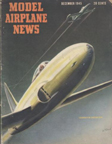
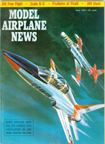
Lockheed P-80 "Shooting Star" and T-33 Trainer
Model Airplane News Covers for December, 1945 and June, 1961
by Jo Kotula
Click to Enlarge
The Lockheed P-80 Shooting Star was the first jet fighter used operationally by the United States Army Air Forces and saw extensive combat in Korea with the United States Air Force as the F-80. As one of the world's first successful turbojet-powered combat aircraft, it helped usher in the "jet age" in the USAF and other air forces worldwide.
One of its claims to fame is in training a new generation of pilots, especially in its closely-related T-33 Shooting Star trainer development.
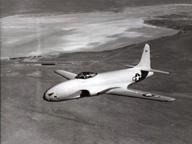
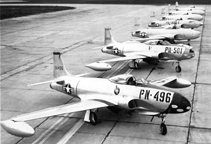
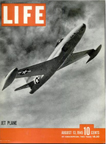
Lockheed P-80 "Shooting Star"
on the cover of LIFE Magazine August 13, 1945
Click to Enlarge
The XP-80 was a conventional, all-metal airframe with a slim low wing and tricycle undercarriage (landing gear). The P-80 was the first operational jet fighter to have its engine integrated within the main fuselage. Other early jet fighters generally had two engines because of their limited power and mounted these in external pods for easier maintenance. With the advent of more powerful engines, fuselage mounting was more effective and would be used by nearly all subsequent fighter aircraft.
When the P-80 was introduced to the American public, it was an immediate success. The sculptural form of the P-80 graced the cover of LIFE Magazine on August 13, 1945. You may use this link to read the entire article (it begins on page 50). Alternatively, you can click here to download a ".pdf" of this article.


Patent Diagrams for the Lockheed P-80 Shooting Star
Design Patent D-143,822
Click to Enlarge
Click Here to learn how to get free patent diagrams
The impetus behind the development of the P-80 was the discovery by Allied intelligence of the German Me 262 jet in the spring of 1943. Commanding General of the U.S. Army Air Forces Henry H. Arnold believed an airframe could be developed to accept the British-made jet engine, and the Materiel Command's Wright Field research and development division tasked Lockheed to design the aircraft. With the Germans clearly far ahead in development, Lockheed was pressed to develop a comparable jet in as short a time as possible. Kelly Johnson submitted a design proposal in mid-June and promised that the prototype would be ready for testing in 180 days. The Skunk Works team, beginning 26 June 1943, produced the airframe in 143 days, delivering it to Muroc Army Airfield on 16 November. However after the Goblin engine was mated to the airframe, foreign object damage during the first run-up destroyed the engine, delaying the first flight until a second engine could be delivered.
Here is a video about the early days of the P-80.
Eventually, the P-80 was developed into the F-94 "Starfire" the first all-weather jet night fighter. The photos and drawing below show the similarity between the P-80 and the F-94.
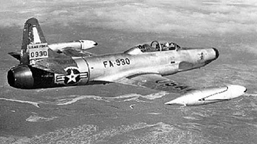
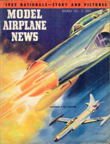
The Lockeed F-94 "Starfire
right: November 1952 cover of Model Airplane News, drawing by Jo Kotula
Click to Enlarge
Click Here for more information about the Lockheed P-80 "Shooting Star".
Cleveland made a "Simplex" kit of the P-80, but the "stick" construction method always left something to be desired for jet airplanes. It was the beginning of the end for this genre -- look at the illustration on the plans of an idealized model of the P-80 -- it just cannot replace the smooth polished sculpural form of the real P-80.
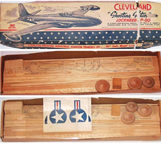
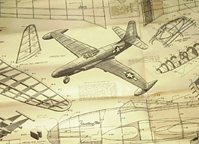
Cleveland Model of the Lockheed P-80 "Shooting Star"
Click to Enlarge
You can buy the plans and patterns that will enable you to make this model right now. Click Here to go to the exact location on the Cleveland Website to get them.
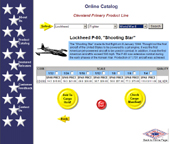
Lockheed P-80 "Shooting Star" at the Cleveland Site
Click to Enlarge
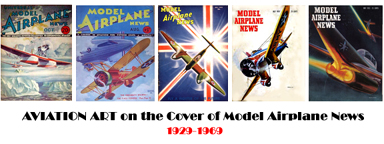
Click to go back and select another cover.
Counter for the Entire Site (not just this page..)
Home | About Lindy | Last Week's Reviews | Upcoming Events | 1940s Collecibles
The Guide - Establishments - Travel - Accessories
Music | Links | Photo Gallery | Extras | Contact